#Beijing Design Week
Explore tagged Tumblr posts
Text

Room 6x8
#Room 6x8#artist#Beijing#gallery#Gallery Sohe#Spurs Gallery#exhibition space#colors#fluo#portfolio#type#typeface#font#Monument Grotesk#2023#Week 40#website#web design#inspire#inspiration#happywebdesign
31 notes
·
View notes
Text
Over the past decade, China has invested hundreds of millions of dollars in its international media network. The Xinhua News Agency, China Global Television Network, China Radio International, and the China Daily web portal produce material in multiple languages and use multiple social-media accounts to amplify it. This huge investment produces plenty of positive coverage of China and benign depictions of the authoritarian world more broadly. Nevertheless, Beijing is also aware that news marked “made in China” doesn’t have anything like the influence that local people, using local media, would have if they were uttering the same messages.
That, in the regime’s thinking, is the ultimate form of propaganda: Get the natives to say it for you. Train them, persuade them, pay them—it doesn’t matter; whatever their motives, they’ll be more convincing. Chinese leaders call this tactic “borrowing boats to reach the sea.”
When a handful of employees at RT, the Russian state television network formerly known as Russia Today, allegedly offered to provide lucrative payments to the talking heads of Tenet Media, a Tennessee-based far-right influencer team, borrowing boats to reach the sea was exactly what they had in mind. According to a federal indictment released last week, RT employees spent nearly $10 million over the course of a year—money “laundered through a network of foreign shell entities,” including companies in Turkey, the United Arab Emirates, the Czech Republic, and Hungary—with the aim of supporting Tenet Media’s work and shaping the messages in its videos.
The indictment makes clear that the influencers—propagandists, in fact—must have had a pretty good idea where the money was coming from. They were told that their benefactor was “Eduard Grigoriann,” a vaguely Euro-Armenian “investor.” They tried to Google him and found nothing; they asked for information and were shown a résumé that included a photograph of a man gazing through the window of a private jet. Sometimes, the messages from Grigoriann’s team were time-stamped in a way that indicated they were written in Moscow. Sometimes the alleged employees of Grigoriann’s alleged company misspelled Grigoriann’s name. Unsurprisingly, in their private conversations, the Tenet Media team occasionally referred to its mysterious backers as “the Russians.”
But the real question is not whether the talking heads of Tenet Media—the founders, Lauren Chen and Liam Donovan, who were the main interlocutors with the Russians, but also Tim Pool, Lauren Southern, Dave Rubin, and Benny Johnson—had guessed the true identity of their “investor.” Nor does it matter whether they knew who was really paying them to make videos that backed up absurd pro-Moscow narratives (that a terrorist attack at a Moscow shopping mall, loudly claimed by the Islamic State, was really carried out by Ukrainians, for example). More important is whether the audience knew, and I think we can safely say that it did not. And now that Tenet Media fans do know who funds their favorite influencers, it’s entirely possible that they won’t care.
This is because the messages formed part of a larger stream of authoritarian ideas that are now ubiquitous on the far right, and that make coherent sense as a package. They denounce U.S. institutions as broken, irreparable: If Donald Trump doesn’t win, it’s because the election is rigged. They imply American society is degenerate: White people are discriminated against in America. They suggest immigrants are part of a coordinated invasion, designed to destroy what remains of the culture: Illegal immigrants are eating household pets, a trope featured during this week’s presidential debate. For the Russians, the amplification of this narrative matters more than specific arguments about Ukraine. As the indictment delicately explains, many of the Russian-sponsored videos produced by Tenet Media were more relevant to American politics than to the Ukraine war: “While the views expressed in the videos are not uniform, the subject matter and content of the videos are often consistent with the Government of Russia’s interest in amplifying U.S. domestic divisions.”
But these themes are also consistent with the Trump campaign’s interest in amplifying U.S. domestic divisions. People who have come to distrust the basic institutions of American democracy, who feel aggrieved and rejected, who believe that immigrants are invaders who have been deliberately sent to replace them—these are not people who will necessarily be bothered that their favorite YouTubers, according to prosecutors, were being sponsored by a violent, lawless foreign dictator who repeatedly threatens the U.S. and its allies with nuclear armageddon. On the contrary, many of them now despise their own country so much that they might be pleased to hear there are foreigners who, like the ex-president, want to burn it all down. If you truly hate modern America—its diversity, its immense energy, its raucous debate—then you won’t mind hearing it denounced by other people who hate it and wish it ill. On X earlier this year, Chen referred to the U.S. as a “tyranny,” for example, a phrase that could easily have been produced by one of the Russian propagandists who regularly decry the U.S. on the evening news.
These pundits and their audience are not manipulated by Russian, Chinese, and other autocrats who sometimes fill their social-media feeds. The relationship goes the other way around; Russian, Chinese, and other influence operations are designed to spread the views of Americans who actively and enthusiastically support the autocratic narrative. You may have laughed at Trump’s rant on Tuesday night: “The people that came in. They’re eating the cats. They’re eating—they’re eating the pets of the people that live there. And this is what’s happening in our country. And it’s a shame.” But that language is meant to reach an audience already primed to believe that Kamala Harris, as Trump himself said, is “destroying this country. And if she becomes president, this country doesn’t have a chance of success. Not only success. We’ll end up being Venezuela on steroids.”
Plenty of other people are trying to reach that audience too. Indeed, the Grigoriann scheme was not the only one revealed in the past few days. In a separate case that has received less attention, the FBI last week filed an affidavit in a Pennsylvania courthouse supporting the seizure of 32 internet domains. The document describes another team of Russian operatives who have engaged in typosquatting—setting up fake news websites whose URLs resemble real ones. The affidavit mentions, for example, washingtonpost.pm, washingtonpost.ltd, fox-news.in, fox-news.top, and forward.pw, but we know there are others. This same propaganda group, known to European investigators as Doppelganger, has also set up similar sites in multiple European languages. Typosquatters do not necessarily seek to drive people to the fake sites. Instead, the fake URLs they provide make posts on Facebook, X, and other social media appear credible. When someone is quickly scrolling, they might not check whether a sensational headline purporting to be from The Washington Post is in fact linked to washingtonpost.pm, the fake site, as opposed to washingtonpost.com, the real one.
But this deception, too, would not work without people who are prepared to believe it. Just as the Grigoriann scam assumed the existence of pundits and viewers who don’t really care who is paying for the videos that make them angry, typosquatting—like all information laundering—assumes the existence of a credulous audience that is already willing to accept outrageous headlines and not ask too many questions. Again, although Russian teams seek to cultivate, influence, and amplify this audience—especially in Pennsylvania, apparently, because in Moscow, they know which swing states matter too—the Russians didn’t create it. Rather, it was created by Trump and the pundits who support him, and merely amplified by foreigners who want our democracy to fail.
These influencers and audiences are cynical, even nihilistic. They have deep distrust in American institutions, especially those connected to elections. We talk a lot about how authoritarianism might arrive in America someday, but in this sense, it’s already here: The United States has a very large population of people who look for, absorb, and believe anti-American messages wherever they are found, whether on the real Fox News or the fake fox-news.in. Trump was speaking directly to them on Tuesday. What happens next is up to other Americans, the ones who don’t believe that their country is cratering into chaos and don’t want a leader who will burn it all down. In the meantime, there are plenty of boats available to borrow for Russians who want to reach the sea.
86 notes
·
View notes
Text


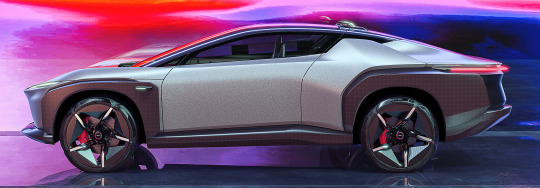
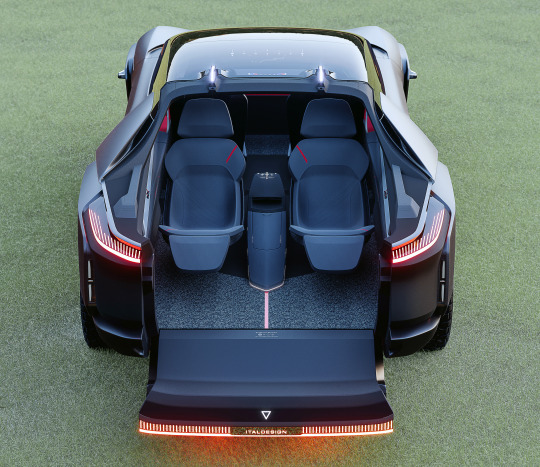



Italdesign Quintessenza Concept, 2024. A large, high riding, electric coupé design study that can also be used as a pick-up. The 4-seat cabin features rear seats that can rotate to face front or back. It was presented last week at Auto China 2024 in Beijing.
#Italdesign#Italdesign Quintessenza#concept#high riding#design study#Auto China 2024#pick-up concept#butterfly doors#EV#electric car#futuristic
134 notes
·
View notes
Text
A designated Jennyanydots cover debut post from Nikki Biddington, who went on for the first time as The Gumbie Cat in Beijing last week.



International Tour, 23 November 2024.
#CATS Musical#CATS the Musical#CATS International Tour 2024#CATS China Tour 2024#CATS UK Tour 2024#Jennyanydots#Nikki Biddington
26 notes
·
View notes
Text
Weird Olympic Moments Tournament
To celebrate (?) the Paris 2024 Olympic Games starting in a few weeks, I thought I'd run another Olympic-themed poll tournament. This time, we're diving into history and getting to know some of the stranger, lesser-known stories of the Games.
Polls will run for a week, and the tournament should last until around early September if I'm doing my math right. The first polls will begin Monday, July 15th.
At the end, we'll award a gold, silver, and bronze to the top three.
After many hours on Wikipedia and the IOC website, here's the list of moments I came up with:
Horse vaulting
Pigeon racing
Sarajevo venues damaged in war
Mayor of Montreal says "The Olympics can no more lose money than a man can have a baby," then proceeds to host one of the most financially disastrous Games in history
George Eyser wins six medals after being run over by a train
Solo synchronized swimming
Crowd gets pooped on by 25,000 pigeons
Flame is taken to top of Mount Everest
Margaret Abbot dies without knowing she made history as the first US woman to win gold
Brazilian team has to sell coffee to afford the trip to Los Angeles
A teenager's "dumb idea" becomes Olympic tradition (athletes marching together in closing ceremony)
St. Louis experiments with "purposeful dehydration", denies water to marathon runners
Kanakuri Shizō takes 54 years to finish his race
Mt. Vesuvius moves the Olympics to London
They stop doing the Olympic salute for some reason
IOC President compares a terrorist attack to a vote to ban a racist country
The Olympics goes 88 years without letting women run marathons
Olympic flame transmitted via satellite
Northern Rhodesia declares independence during Olympics, changes name to Zambia
Vancouver 2010 cauldron malfunction
Montreal 1976 stadium is finally paid off in 2006
The curse of the Beijing 2008 mascots
Everest climbers get gold medals
Sochi snowflake malfunction
They hold the Olympics in 1906, then later say it doesn't count
Colorado kicks the Olympics out
Flame hidden from view after anti-gay law
Summer Olympics held during Winter
Haiti and Liechtenstein discover they had the same flag
Riot at the 1924 rugby match
McDonald's gives out more Big Macs than they expected
Chamonix 1924 retroactively named the Winter Olympics
Doves burned during cauldron lighting
Torchbearer takes olympic flame down a ski jump
Medals made of e-waste
Shooter aims for wrong target, loses gold
Olympic torch passed on International Space Station
Alien addresses crowd
Figure skating debuts at Summer Olympics
Olympics held on two different continents
Rio organizers lose key to stadium gate
Baron de Coubertin wins a gold medal under false identity
1960 winter games held in city named for an ethnic slur
Obstacle Swimming
North Korea considered to co-host 1988
Housing complex for American soldiers during the occupation of Japan becomes the Olympic village
Torch design changed mid-relay
Cauldron lit by flaming arrow
Last three seconds of basketball final replayed three times until results changed
St. Louis threatens to hold their own Olympics if they don't get named host city
Fatso the Fat-Arsed Wombat
Balloon racing
Delirious man carried over finish line by coaches, wins marathon
Summer Olympics held in November and December
Olympics postponed for COVID
Blue screen of death appears during opening ceremony
Marathon runner attacked by priest
Guy kicks referee in the face and (maybe) ends up on a stamp
Jet pack flies over stadium
Centennial games not awarded to a very confident Athens
LA 84 gets in trouble for commercializing the torch relay
Olympic flame relit with cigarette lighter
Rower stops for ducks
Nazi propaganda becomes Olympic tradition (torch relay)
Did I miss a great weird moment? Send it to me in an ask and I might do a round 2 or something!
I chose the moments based on my own personal bias (lol)
Heads up that there is one that involves the death of animals, but I will tag any polls with that #tw animal death
Please don't hesitate to let me know if you need anything else tagged, and how to tag it!
Also, a disclaimer that I'm tired and scatterbrained and I work full time, so if this gets a little disorganized I apologize. Shouldn't be too bad though.
Let the games begin, and whatnot
@tournament-announcer :)
37 notes
·
View notes
Note
caught up with When I Win. s’good!
Was curious about the etymology for the region names? E.g., I’m guessing from Jinjiao’s name he’s meant to be Chinese, so the Bohai region is roughly China? And Nyugen is a Vietnamese surname, so that region’s name (idr atm) is based on the same?
I’m a big fan of etymology so I was just wondering
Hope you’re well
Bohai is the name of the sea near Beijing, which is about where I imagine the region would be. Lachlan Nguyen's region, Giday, was named a bit differently, but refers to Australia. You legally can't get mad at me for that name because the canon name for Hawaii is Alola.
Aracely's region, Visia, is modeled on Los Angeles/Southern California, with Visia being a play on "visual" (a reference to Hollywood). Toril's region, Kylind, is Scandinavian. Toril herself, and all her Pokemon, specifically have Norwegian names.
Though most of these characters never appeared in the story, I did make a chart showing all 16 seeds in the tournament and their region:
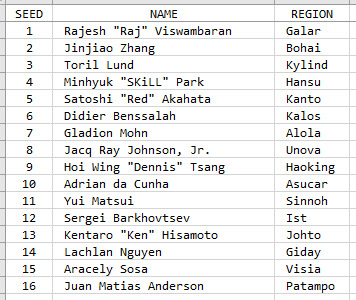
My background is in geography, so I've always been fascinated by Pokemon's pseudo-mapping to the real world. I like Pokemon when it maps more strongly, and dislike it whenever the games make up something completely ridiculous that doesn't fit the real-world area at all. (In recent games, the very boring "need" to have one of every generic JRPG environment - volcano, desert, ice mountain, etc. - has led to a lot of this. Kanto has my favorite region design because of how clearly it maps to Tokyo's urban nature, with the mountainous areas being kept to the fringes of the map.) Probably the most annoying aspect of newer Pokemon games is how it seems like all the research the devs did on the country they're adapting was done in a two-week tourist visit. Unova has it the worst, though, with almost no attempt to make it seem like NYC or even America beyond having a big city. So lame!
22 notes
·
View notes
Text

That's different, a comic for Cafe Remix! A (very mild) villainous duo, going by the designs and Pokemon choice?


The new Slowbro Holowear is now live in Pokemon UNITE!
Oh, they're doing more with that Arceus art I posted a week or so ago, it'll be printed on the prizes for the 2024 Pokemon Card Beijing Masters side event that'll be held in July.




#pokemon cafe remix#pokemon cafe mix#croagunk#pokemon art#slowbro#pokemon unite#holowear#tencent#pokemon tcg#pokemon trading card game#arceus#pikachu
25 notes
·
View notes
Text
𝒟𝒾𝒶𝓂𝑜𝓃𝒹 𝒟𝒶𝓃𝒸𝑒 : 𝒜 ℛ𝑜𝓎𝒶𝓁 𝒢𝓊𝑒𝓈𝓉? [1/?]

Her parents recieved an invitation to the Diamond Dance so they informed Xia Bing to inform their daughter to prepare to go. As Xia Bing help prepare her niece's invitation to Diamond Dance. Marinette's real name is actually Zhao Huifang. Huifang's mother is the sister of Sabine and Shu Yin Cheng.

Sabine went to wake up her daughter who is currently working on a new dress with a hint of white and silver palette on the dress with chinese prints on it as well. "xiǎoxīngxīng (Little Star), it is time for preparation. Your parents want you dress up they got invited to Diamond Dance that Mr. Agreste is holding." She told her niece. "Yes Auntie." Marinette stated as she begin to fix her hair that may look like this since Sabine has so many hair accessories that she never used.
Marinette had finished the hanfu (even though the picture has it pink let say the dress with a hint of silver, gray, and white) the print is gray while some are blend-in. She place the ladybug earrings and pinned it on her chest area where it is now blend in with the color. After all, Marinette is the descendant of Fa Mulan.
Then in a couple hours later, Empress and Emperor of China arrived at the bakery waiting for their daughter. "Huifang, your parents are here. Now run along!" Sabine called her niece as she walked down as Sabine fixed her hair again and get her back in her feet.
As the three left as she soon as she spotted three of her childhood friends from China they were Cai Longwei, Cai Wenyan, and Xu Zhilan they both came from wealthy family who had volunteered to join in since Huifang is coming. Zhilan hugged Huifan as she misses her dearly.
Longwei is the second command general to the China Army back in Beijing while Zhilan is working as a First Class Judge of the World Gourmet Organization but she is also a cocubine for Longwei's brother who's name is Wenyan. Wenyan is the first general of the China Army with his younger brother Longwei.
Huifan and Zhilan begin to chat to catch up what they missed. While Longwei and Wenyan sat behind them. As soon as they arrived to the Diamond Dance a big shocker with Gabriel Agreste on his part. But a surprised look from Bourgeois Family and Tsurugi Family minus Felix who had no idea that Dupain-Cheng is actually ROYAL like Prince Ali.

Arriving at the Diamond Dance, "Greetings, Mr. Gabriel Agreste. My name is Zhao Peizhi and this is my wife Cheng Xiaoqing. And this is my daughter Zhao Huifan who goes under another name as Marinette Dupain-Cheng." This made Chloe and Gabriel to have their expression to go into the drain. Chloe gulped that she bullied a Princess but realize that she isn't the only one bullying her that would Rossi. Even Andre and Audrey were a bit surprised to hear this information. Audrey adore Ms. Zhao's designs but brag this to the Empress.
Kagami was speechless that her friend is a royalty which is good for Tomoe and her family but was amazed of how her daughter's friend manage to put up a surprise like this. As for Felix he had no idea but realize that his cousin had made a big mistake but definitately felt his heart thumping when he sees Dupain-Cheng.
"My daughter told me about your plans but targetting her that is considered a death wish coming from me. I suggest you stop targeting my daughter for whatever your planning with your so called muse." The emperor snarl coldly as Gabriel had no other choice to give up. He definitately do not want to piss them off after hearing this from Andre Bourgeois the last couple of weeks. They control the resources from Asia Terrority they can remove if they wish.
Some of these resources he has were made or came from China while others are from other countries. But he also confess the actions towards Ms. Rossi is about to do towards his daughter which made the Emperor pissed off expression it scared him more than his own father.

Huifan came in the view with Chloe, Zoe, Kagami, and Felix. Chloe splutter in shock. "I thought your father told you from the beginning since elementary?" That made Chloe frozed stiff.. "Oh... I couldn't understand what daddy told me back them sorry." Chloe exclaimed. "Although the Principal should have warn me." She pouted annoyanced. "I'm still getting better though its just the way I act towards the Principal became a habit of mine its hard not to let it go you know." Chloe added as Huifan nodded.
"Oh but I can't wait to see Cerise's reaction once she realize that she messed with a Princess of China. I still have to ask why didn't you use your real name in school?" Chloe questioned her.
"It's because of the a threat but its cleared now hopefully I can finally use it." Huifan answered Chloe's question as she sank her shoulders down. Until that name caught her attention then looked at Chloe, "Who's Cerise?" Huifan asked Chloe.
"Cerise is Lila's new identity name from what she told me after being manipulated by that bitch." Chloe answered truthfully. "I wasn't sure if it was her real name. Daddy is trying to find a way to get into Cerise's files without her noticing it. She seem to know alot than us as teens. Something about her seems off when she entered our school the way she acts is somewhat like adults say it." Chloe commented with an unsured but rather unfeeling vibes when she observed Lila that time.
That caught Huifan's attention the minute Chloe mention about Lila. She didn't know that but now it makes sense to her but had a hunch that Little Miss Lie Alot seem comfortable to do it on her which means she has done this before in the past.
#miraculous ladybug#marinette deserves better#no lila rossi demption#felinette#adrigami#chloe bourgeois#zoe lee#diamond dance#princess marientte#tom and sabine sugar#chloe being chloe#cerise bianca#chloe sugar
10 notes
·
View notes
Text
[2022.11.01] Prologue Official Guidebook - Warm up Routine

Yuzuru Hanyu has showcased countless amazing performances over the years. What makes these performances possible is his daily practice. This time, we focus on his warm-up routine off the ice before he steps onto the rink. Among the various movements and exercises in his warm-up, each with its own meaning and purpose, we highlight four routines.
ROUTINE 01 - He designs his own menu and changes it gradually.
Hanyu says, "I come up with all the different movements and routines myself." "Of course, I reference concepts and theories I’ve studied or been taught. From there, I combine and remove things to make them more suited to skating and to my own needs. The routine changes depending on my condition and the points to watch out for in my jumps, so the menu itself gradually changes over the course of about two weeks. I’ve been building my own warm-up routine since I was about 14. Looking back, there were probably many things that were unnecessary, but I did it in my own way." He also decides his on-ice practice routine. "I originally wanted to do that kind of practice (like SharePractice), but I couldn't play music frequently unless I was alone, so after I came back from Toronto, I started to do this kind of practice."
ROUTINE 02 - Assessing the day's condition and focusing on rhythm and imagery.
Before and during warm-up, Hanyu checks his own videos several times. "Basically, I focus on entering the right imagery and confirming my rhythm. The feeling of timing changes depending on the day, so I try to match it to the rhythm of my body when it's at its best." During his isolation exercises where he moves his shoulders intensely while looking at himself in the mirror, he says, "I try to move to the limit of my range of motion. Also, I use this to check my body condition for the day." He also does quick, repetitive movements such as tightening his right arm in a way similar to the take-off motion for jumps, about 10 times in a row. "When I move quickly, my body tends to wobble, so I try to counter that by tightening my body, with the image of activating a switch to ensure I can jump from any position."
ROUTINE 03 - Checking the ankle position before putting on the skates.
After finishing his off-ice warm-up, he prepares for on-ice practice by putting on his skates. Just before inserting his feet into the boots, Hanyu rotates and twists his ankles. "My ankles are quite unstable, so I reposition them to make sure they're in the right place before putting the skates on." This practice began around the time of the Beijing Olympics. "I used to do this as part of my care routine, but I decided to start doing it right before I put my skates on too."
After inserting his feet into the boots, he carefully touches his foot on the top of the skates before tying the laces. "I do this to make sure they fit properly. The fit of the boots and the feet is crucial to prevent injuries."
ROUTINE 04 - Touching the ice when entering and leaving the rink.
Once everything is ready, he steps onto the ice. The first thing he does is touch the ice. "It's my greeting to the rink. I express the feeling of 'Thank you for allowing me to skate.' And it’s also a way of saying, 'Please be gentle with me, ' so I don’t get hurt. " This is how he begins his ice practice. When he finishes, he always touches the ice again before leaving the rink. This time, it's to say, "Thank you for letting me skate today without injury." Incidentally, after the free skate at the Beijing Olympics, Hanyu placed both hands firmly on the ice as he was leaving the rink. "I had the feeling that the Olympics had come to an end for me and that I wouldn't be skating on that rink again, so I wanted to say, 'Thank you for everything during the Olympics.' It was sad (a way of saying goodbye to the Olympics), but it happened."
Source: Prologue Official Guidebook, pg 32-33
15 notes
·
View notes
Text

Meat
#Meat#design#studio#Toronto#Beijing#portfolio#blur#typography#type#typeface#font#Basel Grotesk#2024#Week 06#website#web design#inspire#inspiration#happywebdesign
2 notes
·
View notes
Text
Not long after China’s leader, Xi Jinping, rose to power in 2012, close observers grew puzzled at how readily he squandered many of the advantages that the country had accumulated over decades of low-friction diplomacy and world-beating economic growth.
Early in his rule, Xi stepped up aggressive moves to claim territorial rights over virtually the entire South China Sea. China also began to accelerate the modernization of its armed forces, rolling out new aircraft carriers and other military technology, and Xi alarmed neighbors with his exhortations to the military to prepare to not only fight, but also win, wars.
At home, Xi began a sweeping anti-corruption drive that quickly looked like a campaign to cow critics and potential rivals. Soon, the regime expanded this political offensive to further constrain speech, and then to bully and humiliate the heads of some of China’s most successful businesses, such as Alibaba, whose fast growth and innovation had helped power the country’s rise.
Many Chinese people justified authoritarianism by turning to the familiar argument that the concentration of power in a disciplined executive can get things done in ways that are not possible amid the palaver and chaos of democracy. For years, Chinese graduate students in my classes boasted about this systemic advantage, but that ended with the suffocating atmosphere of Xi’s crackdown and the alarming economic slowdown that came with it.
Suddenly, conversations turned to what political theorists call the “bad emperor” problem. As a new generation of young adults bemoaned the loss of an era of nearly certain opportunity, they began to see life under authoritarianism as a matter of sheer luck. In a blink, they realized, a seemingly enlightened dictator could be replaced by a rash and benighted despot. For those who experienced this pendulum swing, authoritarianism had a crucial disadvantage: Unlike in democracies, which can vote governments out, the people have no recourse but to ride out their bad fortune and hope for a better successor.
Yet this is not just a problem inherent to authoritarianism. In recent days, it has become increasingly obvious that the world’s oldest and most powerful democracy now faces the bad emperor dilemma.
With each passing week, the United States’ vaunted system of checks and balances has shown itself to be largely impotent in constraining U.S. President Donald Trump’s power. As one Financial Times columnist recently put it, his administration is “engaged in a comprehensive assault on the American republic and the global order it created. Under attack domestically are the state, the rule of law, the role of the legislature, the role of the courts, the commitment to science and the independence of the universities. … Now, he is destroying the liberal international order.”
And while most reelected democratic leaders feel hemmed in by term limits, Trump has become more reckless in his second term, repeatedly raising the specter of extending his power beyond the eight-year constitutional limit.
Ironically, some of Trump’s most foolhardy actions have centered on China. On Wednesday, he paused his arbitrary and irrational imposition of high tariffs on nearly every country—except China. Though Trump may not realize it, his theatrical escalation of tariffs on China, which he raised to 145 percent, will likely be a gift to Xi.
Yes, Beijing will face difficulties in the short term—perhaps even the long run—but Trump’s behavior distracts Chinese people from Xi’s own shortcomings and lends force to Beijing’s long-standing propaganda about the superiority of its political system and Washington’s villainous designs in trying to keep China down.
To the world at large, China now looks like a more moderate force in the international order oriented toward stability and the status quo. If a country has to choose a superpower to hitch its wagon to, China may loom as the preferable option.
Trump’s extreme measures against Beijing have opened avenues for rapprochement between China and its ordinarily distrusting neighbors, Japan and South Korea, and between China and Europe. Trump’s sudden need, amid deflating stock and bond markets, to prove his touted ability to strike deals has also probably enhanced Tokyo’s and Seoul’s negotiating power vis-à-vis his administration. Such is the tactical price that Washington will pay for waging a reckless economic war and failing to rein in a president so foolish and drunk on power as to boast that other leaders are dying to kiss his ass.
Why does Trump possibly think this is worth it? As commentators frequently point out, much of Trump’s worldview was forged in the 1970s and ’80s, the waning era of U.S. industrial preeminence. Back then, Trump first blamed Japan and then China for “stealing” U.S. jobs, production, and ideas. For Trump, Washington’s position atop the hierarchy of nations seems to be about nostalgia, yes, but also birthright. And he seems to think that by punishing others through tariffs, he can restore what was supposedly taken from the United States.
This badly misunderstands not only basic economics, but also world history. It is true that China has likely stolen intellectual property from abroad—from some of the technology in its impressive high-speed trains to the designs of its fighter jets—and devised ways to protect its economy from competition during its recent decades of stirring growth. However, Trump seems unaware that rising powers have done this throughout the modern era, including the United States in the 19th century.
But China’s leadership in automobiles, transportation, renewable energy, and robotics—and its increasingly close peer competition with the United States in artificial intelligence and space exploration—cannot just be explained away by theft. What Trump does not realize is that most of China’s accomplishments have come from the hard work and sacrifice of its people, along with continuous and purposeful national reinvention. In industry, this has involved identifying frontier fields, such as biomedicine and robotics, and investing heavily in them. And that has been supported by equally concerted pushes to improve higher education and make it more widely available.
Bad emperors are not only self-sure and impulsive. They also tend to be badly informed. That is because by the time they have fully subjugated their own political party and surrounded themselves with yes-men, they are rarely exposed to information that contradicts their views.
Trump has conflated his sense of his own invincibility with that of the United States. Because no one at home has been able to resist him, he now imagines that no one in the world can, either—even when members of his administration make contemptuous statements about China that flirt with racism. Vice President J.D. Vance said last week that Americans shouldn’t borrow from “Chinese peasants.” On Sunday, U.S. Commerce Secretary Howard Lutnick dismissed the Chinese factories that have made the global smartphone revolution possible as places where hordes of laborers do little more than “[screw] in little screws.”
Meanwhile, U.S. Treasury Secretary Scott Bessent said this week that China’s business model is broken and “can’t survive” without U.S. markets. (Never mind that China’s exports to the United States as a portion of its global exports have steadily declined from a high of 42 percent in the late 1990s to around 13 percent today.) Bessent imagines a world in which Beijing would be amenable to Washington dictating: “You rebalance. You consume more, manufacture less. We’re going to consume less and manufacture more. … We’re going to level the playing field by a lot.”
This hubristic remark, made by a man often portrayed as the most sober of Trump’s advisors, is stunning in its naivete. It reflects Trump’s nostalgia for an all-powerful U.S. past—a time of deals such as the 1985 Plaza Accord, an agreement that seemingly at the stroke of a pen realigned the world’s major currencies in an effort to reduce the U.S. trade deficit with West Germany and a then-formidably competitive Japan.
But even a China that has started to slow down economically and shrink demographically is quite unlike the Japan of the 1980s, a far smaller country that depended on trade with the United States and relied on it for security. Not only is China roughly 11 times more populous, but in little more than a generation, it has also become the leading trading partner of most countries, a greater source of finance capital than the World Bank, and a military power of the first rank.
“China is an ancient civilization and a land of propriety and righteousness,” China’s Foreign Affairs Ministry said in a recent statement. “We do not provoke trouble, nor are we intimidated by it. Pressuring and threatening are not the right way in dealing with China. China has taken and will continue to take resolute measures to safeguard its sovereignty, security, and development interests.”
Rhetoric aside, this sober statement from Beijing is basically right. The United States will not be able to intimidate China on the basis of tariffs, nor through a bad imperial president’s exaggerated sense of his own power and the nation’s capabilities. It must look at its own weaknesses—not with misplaced nostalgia for a past that is never coming back, but with a positive and demanding agenda for the future.
9 notes
·
View notes
Text
CS-BLANK-AU ARCHIVE
NOTE ⚠️: SOME THINGS I'VE POSTED IN THE PAST MAY CHANGE IN THE FUTURE. REMEMBER THAT NOTHING'S YET SET IN STONE FOR MY AU!!!
CS BLANK AU - OFFICIAL BLOG INTRO-POST - OC posters - 回到历史/Huí dào lìshǐ Caper - Jolly Good Show Caper - Beijing Bullion Caper - Big Bad Ivy Caper CS-BLANK-AU-CONCEPT ART - Paperstar - Julia Argent - Countess Cleo
CARMEN SANDIEGO OC WEEK (CSOW) DAY 1: INTRODUCTION - BLANK DAY 2: MISSION - CHANGE DAY 3: RELATIONSHIP - CONNECTIONS DAY 4: TRAGEDY - UPBRINGING DAY 5: DAY 6: DAY 7:
CARMEN SANDIEGO WEEK (CSW) DAY 1: FAVORITE CHARACTER DAY 2: FAVORITE SHIP DAY 3: N/A DAY 4: VILESONA/OC DAY 5: AU DAY 6: DRESS UP DAY 7: N/A DAY 8: N/A CS-BLANK-AU TESTING/PILOT/SHITPOSTING?? (idk what to call it) - "Introducing a new oc" - "Slight redesign" - "what would happen if you guys had an argument?" - "have some of my CS-AU doodles and drawings cuz y not" - "Wish you were sober Animatic" - "wip game" - "Thoughts on Redcrackle?" - "Philippine history x CS-BLANK-AU?" - "CS-BLANK-AU Anon Critique" - "i was just... goofing around? :3"
CS-BLANK-AU HISTORY - OLD Meet the artist - dec 2023 - OLD Blank character design lineup - OLD CS artstyle guide - OLD Blank voice claim - OLD cs-blank-au oc trailer - HOW DEEP MY CS-AU IS - Concept art Blank - "1st Blank and Shadowsan angst" - "(1st oc intro) ABOUT MY SELF-INSERT OC IN CARMEN SANDIEGO :D"
just something for me to look back at
#10leon13#carmen sandiego#carmen sandiego netflix#carmen sandeigo 2019#carmen sandiego 2019#carmen sandiego blank#archive
21 notes
·
View notes
Text
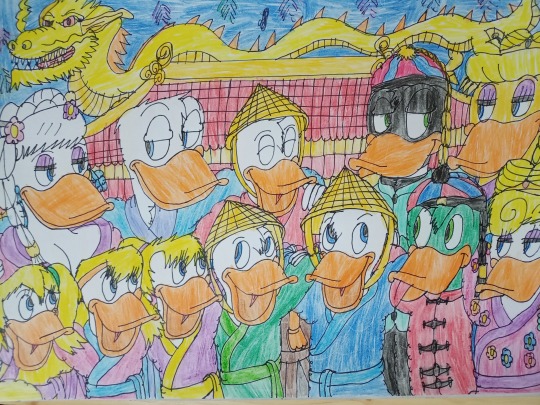
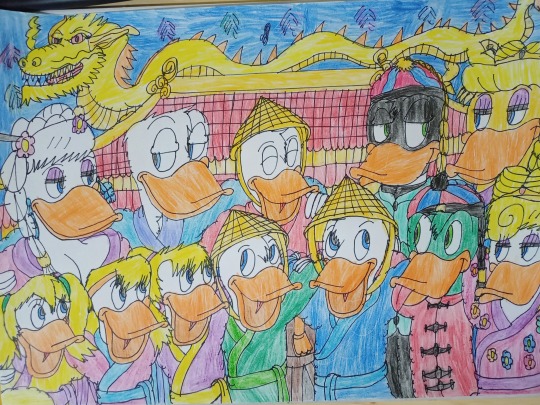
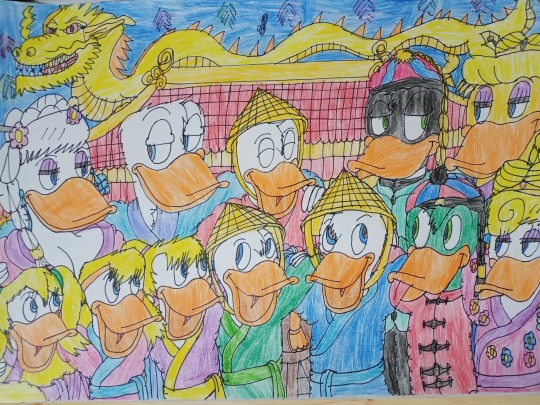
Donald and Daffy Duck with their wives and children in China - Happy New Chinese Year - Year of the Dragon - Crossover Duckverse and Looney Tunes and Tiny Toons
Happy Chinese New Year or Happy Lunar New Year!
Sorry for the delay, but certainly these days are celebrating the Chinese New Year or the Spring Festival according to them. And it's not the same date every year, but it's usually between January 21 and February 20, when the new moon comes after the lunar eclipse, but it's usually on a Saturday. By the way, the custom usually starts when people wear a "Nian" (monstrous Chinese dragon) costume on certain sticks above them as a sign that there was a terrible dragon in China that ate people until once they chased it away with fireworks and the dragon escaped and so according to the legend began the celebration of the Chinese New Year, that is, the spring festival that is celebrated to this day. However, the ancient celebration of the Chinese New Year began only during the reign of the Han Dynasty, while they used to celebrate in autumn, not at the end of winter and the beginning of spring. And that celebration of the Chinese New Year later influenced the entire Far East, as well as almost all of Southeast Asia, with people celebrating the New Year in their own ways, like the Koreans who celebrate Seollal and the Japanese who celebrate Ryukyu. In traditional Chinese, New Year is written 春節, while in Simplified Chinese it is written 春女.
For thousands of years, China has had its culture completely different from the European one, so it is also related to the Chinese signs, each year being someone's symbol, so this year is also the year of the dragon.
Yes, and as a sign of that, as well as the celebration of the Spring Festival, I drew a special drawing where the best ducks, Donald and Daffy Duck with their girlfriends Daisy and Melissa Duck and their children celebrate Chinese New Year in China, in Beijing, in front of the Forbidden Palace, and in traditional Chinese clothing. Donald and Daisy as well as Donald's nephews Huey, Dewey and Louie, and Daisy's nieces April, May and June Duck (comic Dutch design) wear Hanfu clothes to match the colors of the clothes they wear. Donald's nephews wear the Asian conical hat, a traditional hat commonly worn by Asian peoples in East Asia. Daffy Duck and Plucky Duck wear Tang clothing with a traditional Chinese cap with artificial tails (as the Chinese used to wear during the Qing Dynasty), and Melissa Duck and Shirley the Loon wear similar Hanfu clothing with a traditional Chinese hairstyle worn by ladies a few years ago centuries. Yes, Plucky Duck and Shirley the Loon are from Tiny Toons, where they are Daffy Duck's students, but in my headcanon, Plucky is Daffy's nephew and Shirley is Melissa's niece. There is also the Forbidden Palace in Beijing behind them, and above there is a Chinese yellow dragon, as a sign of the year of the dragon (drawn after the Chinese dragon from Ducktales 2017), with all the fireworks to mark the beginning of the New Year. I drew all of them in a classic style, in my own way.
I hope you like this drawing and this idea and this duck crossover and feel free to like and reblog this! Just don't use my same ideas without mentioning me! Thank you! Happy Chinese New Year once again as well as Happy Lunar New Year and Spring Festival which is celebrated for a week!
#my fanart#donald duck#daffy duck#chinese new year#crossover#duckverse#looney tunes#china#tiny toon adventures#tiny toons#ducktales#artists on tumblr#daisy duck#melissa duck#huey dewey and louie#april may and june#plucky duck#shirley the loon#ducks#disney#warner bros#disney ducks#disney duckverse#huey dewey and louie duck#april may and june duck#traditional chinese clothes#yellow dragon#chinese dragon#forbidden palace#beijing
43 notes
·
View notes
Text
youtube
Please take a moment out of your day to check out this incredible 80s-style Iron Fist fan film created by @sky-liam! Sky very generously shared with me the inspiration behind the film, as well as insight into the filming process, fight choreography, and thematic sensibilities:
"As a former martial arts champion, I wanted to show authentic Kung Fu techniques (we were lucky to get an action coordinator who's worked on Chinese martial arts movies). I have a background in Shaolin Kung Fu and competitive Wushu, training and competing for many years, and living in China for a year-and-a-half as well (majoring in Chinese language in college). Going back to some of the original issues of Iron Fist, what really grabbed me was how Danny has trained so long with one goal in mind, and then feels completely lost when he isn't able to complete his revenge on Harold Meachum. I felt like this story was something that anyone could connect to, because so many of us have had that moment where we finished school, or got a 'good' job, and then realized that attaining that single-minded goal didn't actually satisfy us, and we were still searching for something. I also connected with moments from Iron Fist: The Living Weapon when Danny was practicing Kung Fu almost like a drug to keep himself sane. And I connected it to the idea of all those things we do without even thinking because they've become a part of how we define ourselves."





(Behind-the-scenes photos, courtesy of @sky-liam)
"What was most important to me was this sense of [Danny] not being compatible to the world around him; being the Living Weapon but having no target to aim at after Meachum died. Martial arts and fighting becomes a drug to stay above water instead of a means to preserve life. I started Shaolin Kung Fu as a kid and eventually studied Mandarin in college and lived and trained in China for a year-and-a-half, competing in tournaments and working in Kung Fu films there. I wanted to make sure Danny used techniques from actual Shaolin forms (similar to the kind of stuff he'd learn from the monks in K'un-Lun) and also spoke some of the language he picked up while living there. "I knew our fight director, Alfred Hsing, from the Wushu competition scene, and he had also trained in Beijing and worked with Jet Li for several years. He used a lot of 'in-camera editing' in his choreography - that is, setting up short sequences of the fight that were designed to be shot from a specific angle, thus highlighting the best stuff while eliminating wasted camera setups. Of course he also played a version of Steel Serpent in the final fight with Colleen and Danny. "Kara Wang, who played Colleen Wing (and not long after went on to shoot 'Top Gun: Maverick') trained for about three months to complete her fight scene. Our other actors were former athletes with martial arts experience and we also rehearsed choreography for several weeks before shooting. We were able to get many locations for free (the parking garage, the apartment, and the plaza in Monterey Park that doubled for Chinatown) through business and personal connections. "The original short film was about 15 minutes long, and had a lot of voiceover that gave an insight into Danny's inner monologue. We made a few changes to the costumes and events (such as Danny wearing clothes he bought off the rack after coming back to the States, Meachum dying from a drug overdose), which was similar to what was done for the 80s and 90s Marvel adaptations where certain details would be changed for budgetary reasons. In the end, there were some issues with some of the footage in the narrative scenes of the film, so I decided to recut it like a VHS trailer from the 1980s or early 90s would be. "My goal in the end was to highlight some of the grittier story elements of Danny Rand, and to show Iron Fist doing some legit Kung Fu. I hope fans of the character can enjoy it!"
A huge thank you to Sky for sharing this amazing project!
12 notes
·
View notes
Text
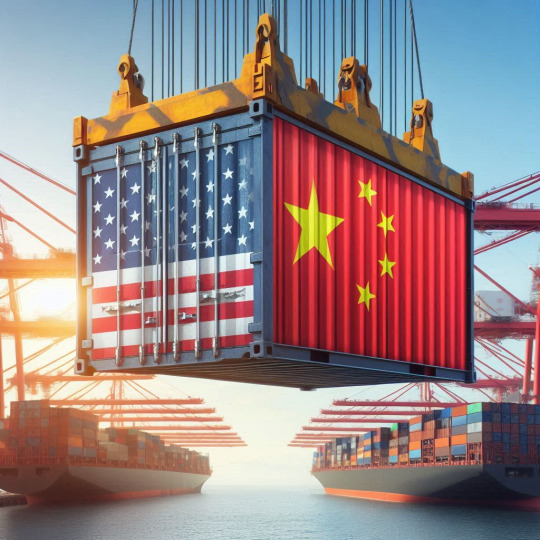
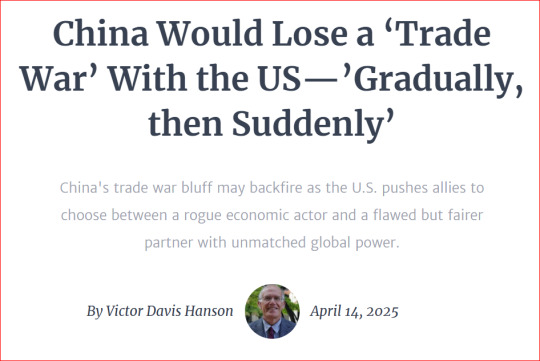
No one wants a “trade war” with China, or for that matter with any nation. Nonetheless, China has been waging one for years and is now locked in a tariff recalibration with the Trump administration.
In this American effort to find trade parity and equity, China can do some short-term damage to the U.S., especially in terms of ceasing exports of some pharmaceuticals, phones, and computers. But ultimately, it cannot win—and will eventually lose catastrophically. It will likely accept that reality sooner rather than later.
We are only in the first week of the escalating rhetoric and tariffs. But already China is appealing to its Asian rivals, Australia, and the EU to join in fighting the supposed American bully.
But so far, there are understandably few takers.
An exasperated China is now also running vintage Korean War-era propaganda videos of Mao Zedong bragging about how he was standing up to then-President Dwight Eisenhower.
Does Beijing really believe that airing ossified threats from decades ago—issued by the greatest mass killer in human history to the one U.S. president who warned of the military-industrial complex—is going to win over neutral nations?
Or maybe China thinks calls to Western nations to stop American trade “bullying” will resonate—this, from the greatest trade bully, cheat, and rogue commercial nation in history.
China is running a nearly $1-trillion trade surplus with the world. Its mercantilism is the result of market manipulations, product dumping, asymmetrical tariffs, patent, copyright and technology theft, a corrupt Chinese judicial system, and Western laxity—or what might be mildly called “bullying.” The U.S. accounts for about a third of China’s trade surplus, with most of the EU and Asian nations accounting for the other two-thirds.
In the past, third-party nations did not appreciate the ends to which China has gone to warp the international trading system. In one sense, unable to address their deficits with China, our friends and neutrals turned to America, where they sought to make up their trade asymmetries by going China-light and running surpluses with the U.S.
However much they criticize the United States, it is unlikely that European and Asian nations will join China—which imposes high tariffs and steals from them—in order to gang up on the U.S., which has tolerated massive trade deficits for decades.
To the degree that the world accepts China as an international commercial rogue nation, it does so out of fear —or, again, on the assumption it can recycle its deficits with Beijing by running surpluses with the vast open American market.
Countries like Panama, which once thought China’s Belt and Road Initiative was advantageous, soon learned that it was exploitative. Nothing is free with China. Its Silk Road policy is mostly designed to manipulate strategically located—and soon to be indebted and subservient—nations as future choke points in times of global tensions and is directed at the West in general and in particular the U.S.
China has done everything possible to incur global distrust and fear.
Most of the world accepts that the COVID-19 epidemic that killed and maimed millions worldwide was birthed in a Wuhan virology lab under the auspices of the People’s Liberation Army. The world also remembers that China and the Chinese-controlled WHO lied repeatedly about the origins and spread of the virus.
The global public may recall that China stopped all domestic flights out of Wuhan on the internal news of the lab leak of the virus, while for days greenlighting nonstop air travel to major European and American cities. The world now accepts that China will never explain exactly when the virus appeared, how it “escaped” from the lab, why it was created in the first place, why Beijing repeatedly lied about all such inquiries, and what happened to an array of whistleblowers who warned of the leak.
China’s so-called allies, such as Russia and India, have historical grievances and ongoing border disputes fueled by Chinese aggression.
NATO, the EU, Japan, South Korea, Australia, and the US also are curious as to why China is using its vast foreign exchange not to lift about a quarter of its population out of third-world-level poverty. Instead, it is frantically building 3-4 nuclear bombs a month, a 700-ship navy, and 2,500 combat aircraft as it ratchets up pressure on Taiwan.
The complexities of trade and tariffs present all sorts of minefields. But the Trump administration is beginning to navigate them, and its trajectory is rather simple. In the next 90 days, it will likely conclude trade deals with our allies and third parties that bring either tariff parity or no tariffs at all that will reduce the U.S. trade deficit.
Of course, our allies and neutrals still use stealth tariffs to ensure advantage by money manipulation, VAT taxes, and pseudo-health and security impediments to free trade. And they deeply resent the Trump administration’s loud denunciations of their surpluses and asymmetrical tariffs. But those machinations can be addressed later in round two after tariff reciprocity or elimination is finalized.
For now, Trump should persuade our allies that if they were not so subject to Chinese mercantilism, they would have more flexibility to ensure fair trade with the U.S. And thus, they should not do something self-destructive and side with China but instead join the U.S. to force China to keep its long-broken promises and play by international rules. A reduced import footprint from China in the U.S. could make room for increased imports from the EU, Japan, South Korea, and Taiwan—if they strike parity deals with the Trump administration. Barring that, they should simply get out of the way and not opportunistically cut reformist trade deals with China.
If China really does reduce most of its exports to the U.S., America will have to scramble for a year or so to establish new supply chains and some alternate importers of U.S. products. But after a year of gradual dislocation, China will begin to hemorrhage, and then quite suddenly, given the U.S. has almost all the advantages—if it chooses to use them.
One, if it ever comes to a real trade war, remember that nations with the higher tariffs and larger trade surpluses usually lose, given that their economies are far more dependent on mercantile exports and trade imbalances. Psychologically, it is far harder to convince the world of victimhood when tariffs and surpluses illustrate contrived trade aggression.
Two, consensual societies are far more flexible in dealing with external pressures and volatile public opinion. True, Trump must face a midterm election in 18 months. However, Xi Jinping may soon face a third of his export factory workforce unemployed—in a society that has no mechanism for them to vent tensions and objections peacefully.
Three, trillions of trade dollars are at stake as a result of the U.S.-China standoff. And should China escalate, it may well lose elsewhere as well. There are nearly 300,000 Chinese students here in the U.S. and now very few Americans in China—plus an unknown number of young Chinese males who mysteriously and illegally crossed the border en masse during the Biden illegal alien influx. A small percentage—but still a significant number, say 1%, or 3,000 “students”—are likely actively engaged in espionage. More importantly, thousands of PhDs and MAs return to China as now Westernized researchers, professors, and government and corporate scientists in technology, engineering, and mathematics.
The results of such technology absorption are not hard to fathom. Almost every Chinese jet fighter, armored vehicle, missile, or rocket; almost every EV automobile; and almost every solar panel have their origins in either U.S. and European research and development or from Western-trained Chinese engineers.
American universities recruit Chinese students and then often charge premium tuition without discounts or scholarships, but then again, universities are not especially popular now. The Trump administration may feel that if the trade war escalates, then it can always choose to recall visas from Chinese students—in the manner there were few Soviet Russian students in the U.S. during the Cold War. That step would serve a dual purpose by forcing universities to recalibrate their finances and cut their unnecessary or deleterious programs.
Almost every Western institution proves a source of Chinese dependency and vulnerability. Its secretive companies are freely listed on Western stock exchanges, even though their financial and earnings reports are most likely warped. Chinese companies could easily be dropped from these venues. They use Western courts to sue with the expectation of judicial equity, while no Western company in China has any such assurance. Chinese billionaires buy U.S. property, not vice versa.
In terms of self-sufficiency, the U.S. is the world’s largest oil and gas producer. China has four times America’s population but only a third of its oil and gas production. China is desperately trying to catch the U.S. militarily but remains behind in both the quality and quantity of its manpower and munitions. It will take a decade or more to match the U.S. all-nuclear submarine fleet, eleven huge nuclear aircraft carriers, the sophistication and number of 4,000 fighters, bombers, and support aircraft, and the 5,000-6,000 nuclear weapons and the American nuclear triad delivery system.
Morally, China is the only major country that holds an entire ethnic minority—over a million Uyghurs—as virtual indentured servants. If China moves on Taiwan, it will face tough global sanctions. If the Ukraine war ends this year, there will be efforts by the Trump administration to adopt Kissingerian triangulation to see that Russia is no closer to China than to the U.S.
In sum, if the Trump administration can conclude first-round—good enough but not yet perfect— trade deals in the next few weeks with major EU countries, Japan, and other Asian and Pacific powerhouses, and then redirect to China, it will gain both political support and economic advantage. It also must message strategically, given that China, for a half-century, has waged a quiet trade war that has now birthed a loud reaction. So, the administration must remember that the current status quo is the aberration, and its correction is a return to normalcy.
After all, in the end, the EU and Asian nations should know the difference between their protective and rules-based ally, with whom they have run up huge and unfair surpluses, and a rogue bully, whose flagrant violations of trade norms and unfair tariffs have ensured them large trade deficits. And if they don’t calibrate their economic self-interest, but act emotionally, then they should at least consider realpolitik facts, such as which nation has the larger economy, the more open political system, and the largest and most lethal military that, in extremis, would come to their aid—against a bullying China.
3 notes
·
View notes
Text
Seething international tensions over the South China Sea have struck an unlikely victim in Vietnam: popular children's dolls pulled from shops over a facial mark supposedly resembling Beijing's claims in the flashpoint waterway.
Small and fluffy, with large eyes and rabbit ears, Chinese-made "Baby Three dolls" became a must-have among Vietnamese kids and Generation Z earlier this year and had been flying off shelves across the country.
That was until an online backlash began over the "Town rabbit V2" model of the doll -- and a marking on its cheek that was said to resemble China's so-called "nine-dash line".
Beijing has long used the line to justify its claims over most of the resource-rich South China Sea, often to the displeasure of Vietnam, which also claims parts of the waterway.
In response to the online outcry, the industry and trade ministry ordered an inspection of toys supposedly displaying the nine-dash line, which it warned were "affecting national security and territorial sovereignty".
Vendors in Hanoi told AFP that most of the offending dolls had been pulled from shelves, but their once-booming business has been shattered, with sales of all models vastly down.
Le, who declined to give her full name, said she used to regularly sell 100 Baby Three dolls a day for up to $20 each, but her sales had dwindled to almost nothing, with just a few now flogged at reduced rates.
"Almost all children started to boycott (the dolls) because they saw it as a nationalistic issue, thinking that buying Baby Three was unpatriotic," she said.
"I've invested so much money into this... it feels like such a waste," she added.
- First 'Barbie', now this -
According to data cited by state media from YouNet ECI, an e-commerce data analysis platform, the average selling price of Baby Three on Shopee and TikTok Shop plummeted by half in the first 10 weeks of 2025.
Vu Tu, 19, told AFP that the toys were "cute and adorable" but the "nine-dash line scandal" had put him off.
"In my opinion, toys with the nine-dash line affect Vietnam's sovereignty and I don't support them," he said.
The controversy comes as the website of Chagee -- a Chinese milk tea brand due to open its first store in Vietnam -- was flooded with angry comments and threats of a boycott last week over a nine-dash line map featured on its website.
In 2023, "Barbie", the fantasy comedy film directed by Greta Gerwig and starring Margot Robbie and Ryan Gosling, was banned from cinemas due to scenes featuring the nine-dash line.
And in 2018, Vietnam cut a scene from the romantic comedy "Crazy Rich Asians" that featured a designer bag with a map of the world showing the disputed South China Sea islands under Beijing's control.
The South China Sea is home to valuable oil and gas deposits and shipping lanes, and several of China's neighbours have voiced concern that Beijing is seeking to expand its reach.
4 notes
·
View notes